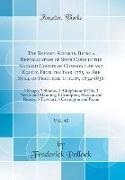Read more
Excerpt from The Revised Reports, Being a Republication of Such Cases in the English Courts of Common Law and Equity, From the Year 1785, as Are Still of Practical Utility, 1834-1836, Vol. 40: 3 Knapp, 7 Simons, 1 Adolphus and Ellis, 3 Nevile and Manning, 1 Crompton, Meeson and Roscoe, 5 Tyrwhitt, 6 Carrington and Payne
The proportion of cases ha ving an obvious importance or interest for modern readers increases as the work of the Revised Reports proceeds. A. G. V. Pearson, p. 149, is one of the line of cases shewing how a secular court may have to ascertain, as matter of fact, What the tenets of any tolerated denomination are, and to regulate accordingly the application of charitable funds appropriated to that denomination. This has sometimes - but inaccurately, it is conceived - been said to amount to a quasi establishment of the institutions affected. A. Much stronger case is the reconstitution of the Primitive Wesleyan Methodist Society of Ireland, in 1871, by a public Act (34 35 Vict. C. To which a catechetical exposition of the Society's principles, so far as regards discipline, is annexed by way of schedule. That exposition certam disclaims in terms the position of an independent Church for the Methodist Society: but it would seem that, Whatever may be the proper name of the action taken by the Legislature on this occasion, the position of a Society Which could obtain such an Act cannot be correctly described as one of mere toleration.
About the Publisher
Forgotten Books publishes hundreds of thousands of rare and classic books. Find more at www.forgottenbooks.com
This book is a reproduction of an important historical work. Forgotten Books uses state-of-the-art technology to digitally reconstruct the work, preserving the original format whilst repairing imperfections present in the aged copy. In rare cases, an imperfection in the original, such as a blemish or missing page, may be replicated in our edition. We do, however, repair the vast majority of imperfections successfully; any imperfections that remain are intentionally left to preserve the state of such historical works.

